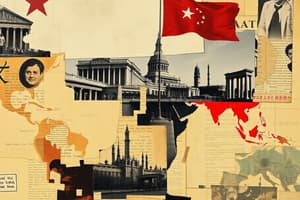Podcast
Questions and Answers
What is the key factor Thucydides identifies as the cause of the Peloponnesian Wars?
What is the key factor Thucydides identifies as the cause of the Peloponnesian Wars?
- Uneven growth of power among states
- Distribution of power (correct)
- Role of human nature
- Security Dilemma
According to realist theory, what drives conflict in international relations?
According to realist theory, what drives conflict in international relations?
- Human nature (correct)
- Intentions of states
- States seeking absolute gains
- Presence of sovereign authority
What concept is associated with the idea that states prefer to gain more compared to others rather than focusing on absolute gains?
What concept is associated with the idea that states prefer to gain more compared to others rather than focusing on absolute gains?
- Hierarchy
- Multipolarity
- Security Dilemma
- Relative gains (correct)
What is the defining feature of the international system according to realists that leads to recurring conflict?
What is the defining feature of the international system according to realists that leads to recurring conflict?
In the context of hegemonic war theory, when is a conflict considered a hegemonic war?
In the context of hegemonic war theory, when is a conflict considered a hegemonic war?
Which factor does Thucydides and classical realists attribute as the cause of war?
Which factor does Thucydides and classical realists attribute as the cause of war?
What does a theory in international relations do?
What does a theory in international relations do?
Why is a theory compared to a spotlight rather than a floodlight?
Why is a theory compared to a spotlight rather than a floodlight?
What is the central concern of classical realists, like Thucydides?
What is the central concern of classical realists, like Thucydides?
What is the primary goal of states according to the text?
What is the primary goal of states according to the text?
Why do states focus more on capabilities rather than intentions when making foreign policy decisions?
Why do states focus more on capabilities rather than intentions when making foreign policy decisions?
What aspect of the international system determines its structure according to classical realist beliefs?
What aspect of the international system determines its structure according to classical realist beliefs?
Flashcards are hidden until you start studying
Study Notes
The Role of Theory in International Relations
- Theory helps make sense of facts and explains past and predicts future behavior and phenomena in international relations.
- A theory is like a spotlight, highlighting specific aspects of what we want to understand.
Classical Realism
- Famous classical realists: Thucydides and others
- Classical realist beliefs:
- Distribution of power determines the structure of the international system
- Competition and war among states is normal
- Human nature is a source of conflict and does not change
- The state is a rational unitary actor
- To understand a state's foreign policy, we only need to know its position on the power hierarchy
Distribution of Power
- The distribution of power determines the structure of the international system: bipolarity, multipolarity, or unipolarity
- Consequences of changing distribution of power: uncertainty, balancing vs. bandwagoning alliance behavior, and risk of hegemonic war
Thucydides and Hegemonic War
- Thucydides is considered the first realist because he explained the origins of the Peloponnesian Wars as a consequence of the balance/distribution of power
- Hegemonic war: war between a hegemon and a rising state that threatens the hegemon and results in a new distribution of power
Human Nature and War
- Thucydides/classical realists: human nature causes war due to people's lust for power, selfishness, aggression, fear, and distrust
- Gilpin/neorealists: the nature of the international system causes war, not human nature
Anarchy and the International System
- Anarchy: the absence of a sovereign authority
- Hierarchy: the presence of a sovereign authority
- Implications of anarchy:
- Self-help world
- Preference for relative gains over absolute gains
Studying That Suits You
Use AI to generate personalized quizzes and flashcards to suit your learning preferences.




